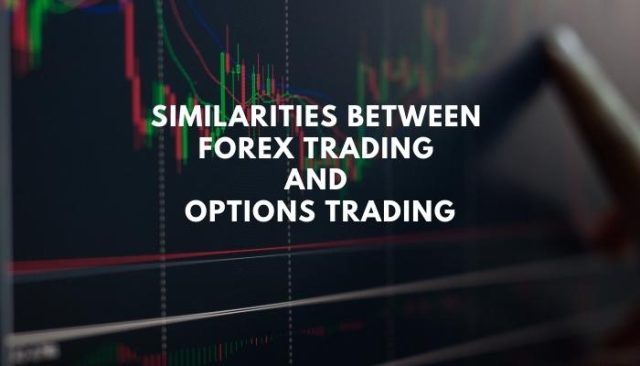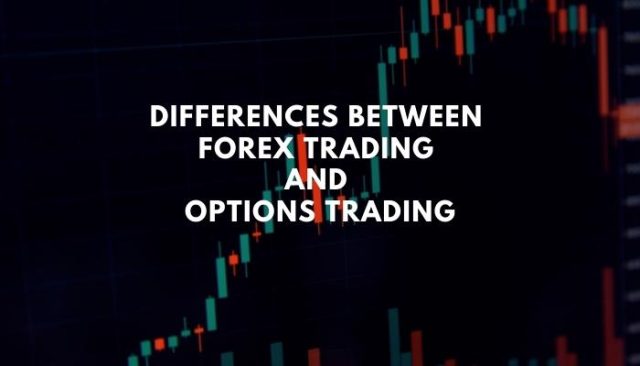Forex vs Options – See the Difference
By Jordan Blake
January 10, 2024 • Fact checked by Dumb Little Man
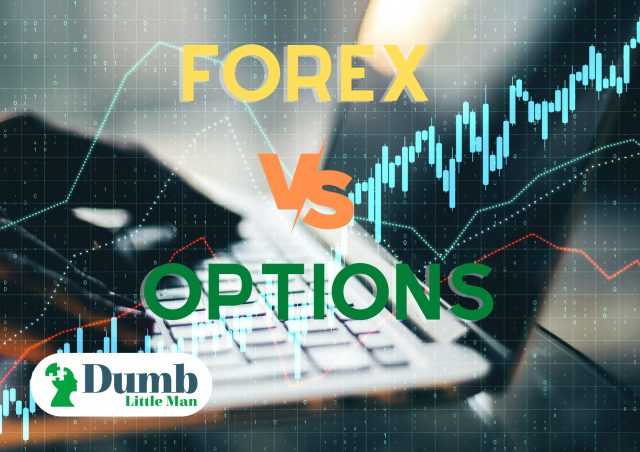
Want to jump straight to the answer? The best forex broker for traders is Avatrade
The #1 Forex Trading Course is Asia Forex Mentor
The main difference between Forex and Options is the nature of the asset being traded. When trading options, traders trade a contract on an asset (forex, crypto, futures, commodities, indices) based on a belief about price movement over a specified time period. Forex trading involves trading currency pairs by buying strong currencies and selling weak ones with the aim of making profits.
Options trading allows traders to trade several assets and asset classes and make profits based on their speculation about price movement to a specific price level or otherwise. Foreign exchange trading involves profiting from currency pairs specifically, based on fluctuations in the exchange rate.
In this review, we would discuss the similarities and differences between Forex trading and Options trading, as well as their Pros and Cons.
Forex vs Options: Similarities Between Forex Trading and Options Trading
#1. Regulation
Both Forex and Options trading is regulated by regulatory agencies and authorities in different countries and regions. Regulations are guidelines that traders, investors, and brokers have to follow. They specify the assets or currencies that can be traded, how they can be traded, the trading strategies that can be used, and some other criteria that have to be met by Forex or options brokers.
These regulations are often unique to a specific region, depending on the specifications of the regulatory authority. For example, forex traders in the US are banned from hedging trades while trading a currency pair in the forex market. Before trading forex or options, make sure you understand the regulatory guidelines and requirements in your country or region.
Why Are Regulations Important?
- They help to keep brokers in check and ensure they maintain the best trading practices.
- They protect the interest of traders and secure their trades and capital.
- Regulations generally maintain stability and order in the financial markets.
#2. Leverage
Leverage is provided by both forex brokers and options brokers. Having an account with leverage ensures that you can purchase or control more assets than your deposited funds would ordinarily permit. The leverage increases the buying power of your deposited funds and this buying power increases as the leverage increases.
Forex traders who trade forex on leverage can purchase forex currency pairs that are up to 1000 times their own capital. Options brokers usually have lower leverages compared to forex brokers, but the leverage is nonetheless sufficient for traders to make massive gains on their retail investor accounts.
Trading with high leverage on a Forex or options broker is a double-edged sword. It presents a lot of profit potential but in the wrong hands, it can lead to poor risk management and loss of deposited funds due to greed.
#3. Accessibility
Trading Forex or options is quite accessible because trading platforms and brokers have made it easy for traders to open trading accounts and execute trades. These accounts can be opened and verified in minutes, after which a deposit is made and trades can be executed.
These accounts mostly have age restrictions specified by the regulatory authority. Besides this, there aren't any regulations that specifically prevent people from trading the options and forex markets (except in countries where certain instruments or financial market trading itself is banned).
But, access to trading platforms and services shouldn't be a reason to trade without a plan. Before trading the financial markets, ensure you understand the asset to be traded, learn a trading strategy and create a trading plan.
| RECOMMENDED TRADING COURSE | REVIEW | VISIT |
|---|---|---|
 | #1 Forex, Crypto and Stocks trading course. Ranked most comprehensive by Investopedia and Best by Benzinga. Free to Try! |  |
Differences Between Forex Trading and Options Trading
#1. Volatility/Liquidity
The forex market is an extremely liquid market. This means that it's easy for buyers of currency pairs to be paired with sellers of the same currency pair while trading on a brokerage platform. The high liquidity of the forex market ensures that price movements are less erratic and random. Hence, the forex market is usually moderately volatile.
Unlike forex trading, the Options market is less liquid because there are lesser market participants. This can lead to high volatility or random price fluctuations.
The forex market is the most liquid market and this implies that forex trades are executed or fulfilled easily compared to options trades. The benefit of this is that forex traders are able to execute trades quickly and easily.
#2. Asset Type
The assets traded by forex traders are forex currency pairs, while options traders trade options contracts which are simply asset derivatives.
Forex traders trade national currencies in form of currency pairs. They buy strong currencies and sell weak ones. To forecast the potential strength or weakness of a currency, traders use trading tools, systems, and technical indicators. These help to analyze the currency market and forecast the movement of the underlying currency pair.
In options trading, the options contracts are the assets being traded. Since they are asset derivatives, you can trade forex options, stock options, or any options contract for any given asset class. Unlike currency trading, options trading provides multiple tradeable assets in form of asset derivatives for traders to trade.
#3. 24-Hour Trading
The options market can be traded from Monday to Friday from 9:30 a.m. to 4 p.m. EST. The forex market is open 24 hours per day. However, the volatility of the foreign exchange market can reduce drastically at certain hours of the day – at the beginning and end of a new day.
At the beginning of the forex trading day, it is possible to experience a price gap. A price gap is a jump in price as the market responds to new data such as news or economic data. This can sometimes occur at the beginning of a new trading week because most brokers close on the weekends.
What is Forex Trading

Forex trading simply means buying and selling currencies for profits. The currencies are traded in pairs and forex trades require you to buy one currency while selling the other currency that makes up the pair. The weaker currency is sold while the stronger of the pair is bought simultaneously.
Therefore, forecasting price movement is obviously critical to successful currency trading. Traders try to avoid losing money rapidly by using technical indicators and systems of analysis to forecast price movement. As a forex trader, you need to gain trading expertise using a specific trading strategy, before executing trades on a forex account.
As a retail trader, trading forex requires you to open an account on a brokerage platform and deposit your capital. This allows you to execute and manage trades in line with your speculation.
The foreign currency exchange market is the largest and most liquid of all financial markets. It provides infinite opportunities and limitless profit potentials.
| Broker | Best For | More Details |
|---|---|---|
 |
| securely through Avatrade website |
| Broker | Best For | More Details |
|---|---|---|
| securely through FXCC website |
What is Options Trading
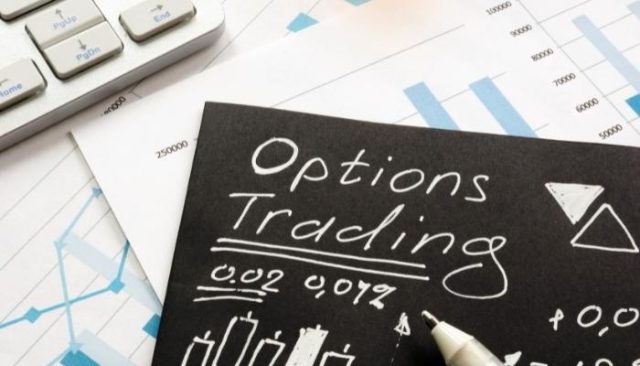
Options trading allows traders to trade options contracts which are simply asset derivatives. This means that options trading provides access to contracts from different asset classes. Options traders trade based on speculation about price movement during or after a specified time period.
Call trades are executed when a trader has a bullish bias. If the price of an asset trades above the strike price after the specified time elapses, then the call trade would turn out profitable. When a trader has a bearish bias, a put option is selected. This allows the trader to make profits if the price of the chosen asset trades below the strike price after the specified time elapses.
| Broker | Best For | More Details |
|---|---|---|
 |
| securely through TradeStation website |
| Broker | Best For | More Details |
|---|---|---|
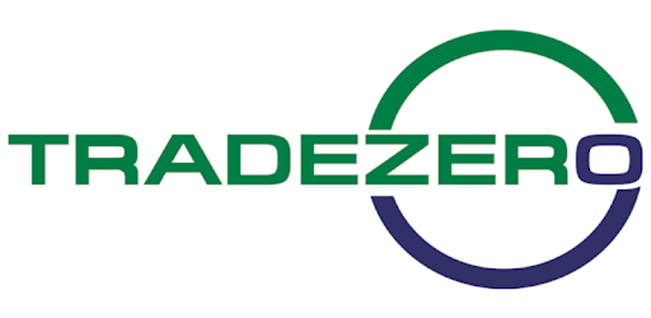 | Beginners
| securely through Tradezero Strategies website |
Pros and Cons of Forex Trading
Pros
- High liquidity allows for quick trade executions.
- High leverage helps traders make huge profits with comparatively small capital.
- The high liquidity helps to stabilize the forex markets
- No middleman fees
Cons
- High liquidity can reduce the volatility
- High leverage can easily lead to loss of deposited funds
Pros and Cons of Options Trading
Pros
- Trading asset derivatives can yield significantly higher profits than trading the underlying assets.
- Lower barrier to entry
- High risk to reward potential
- Saves time and allows traders to earn quickly
Cons
- Options trading can be complicated and difficult to understand
- Low liquidity compared to forex trading
Best Forex Brokers for Trading
| Broker | Best For | More Details |
|---|---|---|
 | Advanced Non US Traders Read Review | securely through Avatrade website |
 | Intermediate Non-US Traders Read Review | securely through FXCC website |
Overall Broker | securely through Forex.com website | |
 | Professional Forex Traders Read Review | securely through Interactive Brokers website |
Best Options Brokers for Trading
| Broker | Best For | More Details |
|---|---|---|
 | Advanced Traders Read Review | securely through Tradestation website |
 | Powerful Services at a Low Cost | securely through Tradezero website |
Web Platforms Read Review | securely through eTrade website | |
 | Professional Forex Traders Read Review | securely through Interactive Brokers website |
Best Forex Trading Course

Investing in the Forex market might seem to be a daunting task especially if you are a beginner, and have just started exploring the Forex market. Although experience is said to be the best teacher when dealing in the Forex market, it is good to learn about the Forex market briefly before making your first investment.
There are several ways in which you can start expanding your knowledge of the stock market. You can either start reading books or ask for tips from your friends or family members who have prior experience of trading on the Forex platform. However, the former is a time-consuming method while the latter is not always a credible learning source.
If you want to learn about investing in the Forex market that would help you gain knowledge, and tell you all you need to know about the market, then you can opt for some professional courses available on the internet. These courses are developed by Forex markets experts who have years of training Forex traders.
Now, there are thousands of courses on the internet that claim to teach you about Forex investment. However, not all of these courses are reliable and give accurate information. So which is the best Forex course for learning the ins and out's of the Forex market?
Asia forex mentor course by Ezekiel is by far one of the best Forex learning courses on the internet, and they are one of the best learning sources if you want to expand your Forex trading knowledge.
They have been featured on multiple different leading forex platforms and Forex events happening around the world. Ezekiel's platform is the perfect solution for you to learn because their clients include multiple trainees and bank traders from private trading institutions around the globe.
It is the number one course available on the internet because it also reaches new bank traders and has fun managing if you want to make money from trading forex stocks and other commodities.
You can get a great return on investment by indulging yourself in this systematic course. Even if you are a beginner in the field and do not have enough experience and knowledge about Forex trading, you still join this program with zero knowledge. Everything will be taught to you from scratch, and you can enroll yourself in this program right now to get started.
Check out the testimonials on the website and start your Forex trading journey right away. The good thing about this course is that you will be crystal clear about what you need to do from day one.
They are using a return on investment approach to teaching their students. It is a scientific method of beating the market, and you will not be taught this somewhere else.
| RECOMMENDED TRADING COURSE | REVIEW | VISIT |
|---|---|---|
 | #1 Forex, Crypto and Stocks trading course. Ranked most comprehensive by Investopedia and Best by Benzinga. Free to Try! |  |
Conclusion: Forex vs Options
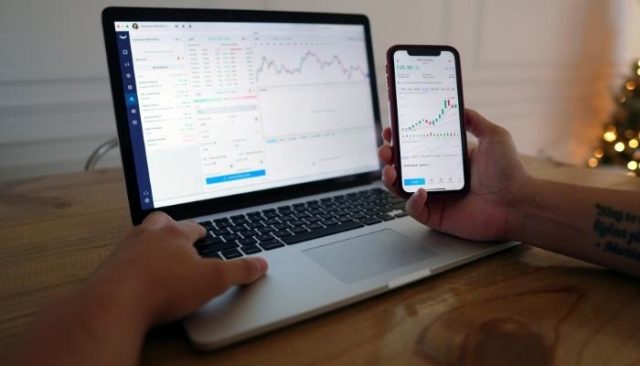
Finally, the main difference between Forex and Options trading is the nature of the assets being traded. While forex trading focuses on trading currencies for profits, options trading involves trading asset derivatives. These derivatives cut across multiple asset classes.
However, options and forex trading are regulated styles of trading. They are highly accessible to traders all around the world and aim to provide opportunities for traders to participate meaningfully and make profits.
Both options and forex trading are profitable ways of trading financial assets and instruments. Traders can trade forex and options through regulated brokers that provide a platform to analyze the markets, execute and manage trades.
These markets can be analyzed through tools and systems of technical and fundamental analysis which help to forecast price movement. Regardless of the assets being traded, becoming a successful trader requires patience, discipline, and the ability to consistently follow a trading plan which contains a rule-based strategy.
Forex vs Options FAQs
What are the benefits of Forex trading?
The benefits of Forex trading are numerous. In short, it helps traders with wealth creation, self-discipline and self-discovery.
Trading helps to build self-discipline by teaching traders the importance of following laid down rules in a trading plan, regardless of the outcome. Self-discipline is needed for traders to practice proper risk management and trade execution based on a rule-based strategy.
Forex trading forces traders to understand themselves as individuals. By understanding their personality traits, strengths and weaknesses, traders can make trading rules and strategies that are best suited for them.
Lastly, Forex trading is a great way to accumulate and compound wealth because the trading opportunities and profit potentials are limitless.
Can you make more money trading stock or forex options?
Stocks and forex options are equally profitable. The amount of money made by trading them depends on the trading skills and experience of the trader.
Jordan Blake
Jordan Blake is a cultural commentator and trending news writer with a flair for connecting viral moments to the bigger social picture. With a background in journalism and media studies, Jordan writes timely, thought-provoking content on everything from internet challenges and influencer scandals to viral activism and Gen Z trends. His tone is witty, observant, and sharp—cutting through the noise to bring readers the “why” behind the “what.” Jordan’s stories often go deeper than headlines, drawing links to pop culture, identity, and digital behavior. He’s contributed to online media hubs and social commentary blogs and occasionally moderates online panels on media literacy. When he’s not chasing the next big trend, Jordan is probably making memes or deep-diving into Reddit threads. He believes today’s trends are tomorrow’s cultural history—and loves helping readers make sense of it all.

